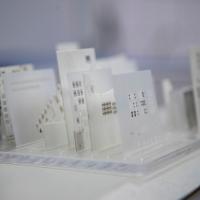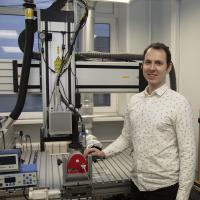In February, the awarding ceremony for the winners of the competition for the Moscow Government Young Scientists 2019 prize was held in the State Kremlin Palace. Laureate of the competition in the nomination “Instrument Making” was the engineer of the Department of Micro- and Nanoelectronics NESPI MEPhI Konstantin Oblov. About three years, his research team has been working on a simple and inexpensive 3D printer for microelectronic products.
Modern equipment for the production of electronic components has a variety of disadvantages: high cost, complexity and high cost of maintenance, and sometimes just the unavailability of consumables. A few years ago, the staff of the Department of Micro- and Nanoelectronics at MEPhI had the idea to make their own equipment to circumvent these limitations. Since then, they began working on a project to create a hardware-software complex for four-coordinate adaptive laser micro-milling, which would allow small scientific teams to get the same result as on an industrial scale.
The equipment is a new multifunctional device — a combination of several devices, which is already on the market. In fact, this is a regular laser marker, supplemented by software and hardware. The main feature is that special software has been written for this project that integrates a roughness measurement system, a microscope and a metallization application system.
It turns out that it is a relatively inexpensive and easy to use 3D printer for microelectronic products. With the help of this equipment, you can repeat all the same operations that are done in large laboratories, and also use new materials that are difficult to process using other technologies. For example, aluminum and zirconium ceramics, which are also used to create gas sensors.
The complex does not need specialized "clean rooms" and is available for work even for an undergraduate student who knows the basics of 3D printing, three-dimensional modeling and laser cutting. Moreover, its cost does not exceed 150 thousand US dollars. For comparison, the cost of the technological line of equipment for the manufacture of ceramic MEMS products and SMD cases according to traditional technology is estimated in millions of US dollars.
Currently, the created hardware-software complex is used at MEPhI as an exclusive technology for the manufacture of ceramic MEMS sensors and is also used in three international scientific projects.










